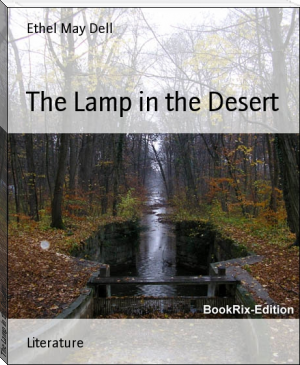The Top of the World by Ethel May Dell (most inspirational books of all time txt) 📖

- Author: Ethel May Dell
Book online «The Top of the World by Ethel May Dell (most inspirational books of all time txt) 📖». Author Ethel May Dell
Slowly her thoughts passed on to the coming of Guy. She realized that the rapid events that had succeeded his coming had rendered her impressions of Burke a little blurred. Through all those first stages of Guy's illness, she could scarcely recall him at all. Her mind was full of the image of Kieff, subtle, cruel, almost ghoulish, a man of deep cunning and incomprehensible motives. It had suited his whim to save Guy. She had often wondered why. She was certain that no impulse of affection had moved him or was capable of moving him. No pity, no sympathy, had ever complicated this man's aims or crippled his achievements. He had a clear, substantial reason for everything that he did. It had pleased him to bring Guy back to life, and so he had not scrupled as to the means he had employed to do so. He had practically forced her into a position which circumstances had combined to make her retain. He had probably, she reflected now, urged Guy upon every opportunity to play the traitor to his best friend. He had established over him an influence which she felt that it would take her utmost effort to overthrow. He had even forced him into the quagmire of crime. For that Guy had done this thing, or would ever have dreamed of doing it, on his own initiative she did not believe. And it was that certainty which had sent her from his empty hut on the sand in pursuit of him, daring all to win him back ere he had sunk too deep for deliverance. She had ridden to Ritzen by way of the Vreiboom's farm, half-expecting to find Guy there. But she had seen only Kieff and Piet Vreiboom. Her face burned still at the memory of the former's satirical assurance that Guy was but a few miles ahead of her and she would easily overtake him. He had translated this speech to Piet Vreiboom who had laughed, laughed with a sickening significance, at the joke. In her disgust she had ridden swiftly on without stopping to ascertain if Guy had gone to Ritzen or had decided to ride the whole forty miles to Brennerstadt.
The lateness of the hour, however, had decided her to make for the former place since she knew she could get a train there on the following morning and she could not face the long journey at night alone on the _veldt_. It had been late when she reached Ritzen, but she had thankfully found accommodation for the night at the by no means luxurious hotel in which she had slept on the night of her arrival so long ago.
Now in the early morning she was ready to start again, having regretfully left her horse, Diamond, in the hotel-stable to await her return.
If all went well, she counted upon being back, perhaps with Guy accompanying her, in the early afternoon. And then she would probably be at Blue Hill Farm again before Burke's return. She hoped with all her heart to accomplish this. For though it would be impossible to hide the fact of her journey from him, she did not want him to suspect the actual reason that had made it so urgent. Let him think that anxiety for Guy--their mutual charge--had sent her after him! But never, for Guy's sake, let him imagine the actual shameful facts of the case! She counted upon Burke's ignorance as the strongest weapon for Guy's persuasion. Let him but realize that a way of escape yet remained to him, and she believed that he would take it. For surely--ah, surely, if she knew him--he had begun already to repent in burning shame and self-loathing.
He must have ridden all the way to Brennerstadt, for he was not at Ritzen. Ritzen was not a place to hide in. Would she find him at Brennerstadt? There were only two hotels there, and Kieff had said he would stop at one of them. She did not trust Kieff for a moment, but some inner conviction told her that it was his intention that she should find Guy. He did not expect her influence to overcome his. That she fully realized. He was not afraid of being superseded. Perhaps he wanted to demonstrate to her her utter weakness. Perhaps he had deeper schemes. She did not stop to imagine what they were. She shrank from the thought of them as purity shrinks instinctively from the contemplation of evil. She believed that, if once she could meet Guy face to face, she could defeat him. She counted upon that understanding which had been between them from the beginning and which had drawn them to each other in spite of all opposition. She counted upon that part of Guy which Kieff had never known, those hidden qualities which vice had overgrown like a fungus but which she knew were still existent under the surface evil. Guy had been generous and frank in the old days, a lover of fair play, an impetuous follower of anything that appealed to him as great. She was sure that these characteristics had been an essential part of his nature. He had failed through instability, through self-indulgence and weakness of purpose. But he was not fundamentally wicked. She was sure that she could appeal to those good impulses within him, and that she would not appeal in vain. She was sure that the power of good would still be paramount over him if she held out to him the helping hand which he so sorely needed. She had the strength within her--strength that was more than human--and she was certain of the victory, if only she could find him quickly, quickly!
As she sat there waiting feverishly to start, her whole being was in a passion of supplication that she might be in time. Even in her sleep she had prayed that one prayer with a fierce urging that had rendered actual repose an impossibility. She had never in her life prayed with so intense a force. It was as if she were staking the whole of her faith upon that one importunate plea, and though no answer came to her striving spirit, she told herself that it could not be in vain. In all her maddening anxiety and impatience she never for a moment dwelt upon the chance of failure. God could not suffer her to fail when she had fought so hard. Her very brain seemed on fire with the urgency of her mission, and again for a space the thought of Burke was crowded out. He occupied the back of her mind, but she would not voluntarily turn towards him. That would come later when her mission was fulfilled, when she could look him in the face again with no sense of a charge neglected, or trust betrayed. She must stand straight with Burke, but she must save Guy first, whatever the effort, whatever the cost. She felt she had forfeited the right to think of her own happiness till her negligence--and the terrible consequences thereof--had been remedied. Perhaps it was in a measure self-blame that inspired her frantic prayer, the feeling that the responsibility was hers, and therefore that she was a sharer of the guilt. That was another plea, less worthy perhaps; but one to which Guy could not refuse to listen. It could not be his intention to wreck her happiness. He could not know all that hung upon it. Her happiness! She shivered suddenly in the chill of the morning air. Could it be that happiness--the greatest of all--had been actually within her grasp, and she had let it slip unheeded? Sharply she turned her thoughts back. No, she must not--must not think of Burke just then.
The chance would come again. The chance must come again. But she must not suffer herself to contemplate it now. She had forfeited the right.
Time passed. She thought the train would never start. The long waiting had become almost a nightmare. She felt she would not be able to endure it much longer. The night had seemed endless too, a perpetual dozing and waking that had seemed to multiply the hours. Now and then she realized that she was very tired; but for the most part the fever of impatience that possessed her kept the consciousness of fatigue at bay. If only she could keep moving she felt that she could face anything.
The day broke over the _veldt_ and the scattered open town, with a burning splendour like the kindling of a great fire. She watched the dawn-light spread till the northern hills shone with a celestial radiance. She leaned from the train to watch it; and as she watched, the whole world turned golden.
Burke's words flashed back upon her with a force irresistible. "Let us go to the top of the world by ourselves!" Her eyes filled with sudden tears, and as she sank down again in her seat the train began to move. It bore her relentlessly southwards, and the land of the early morning was left behind.
She reflected later that that journey must have been doomed to disaster from the very outset. It was begun an hour late, and all things seemed to conspire to hinder them. After many halts, the breaking of an engine-piston rendered them helpless, and the heat of the day found them in a desolate place among _kopjes_ that seemed to crowd them in, cutting off every current of air, while the sun blazed mercilessly overhead and the sand-flies ceaselessly buzzed and tormented. It was the longest day that Sylvia had ever known, and she thought that the smell of Kaffirs would haunt her all her life. Of the few white men on the train she knew not one, and the desolation of despair entered into her.
By the afternoon, when she had hoped to be on her way back, tardy help arrived, and they crawled into Brennerstadt station, parched and dusty and half-starved, some three hours later.
Hope revived in her as at length she left the train. Anything was better than the awful inactivity of that well-nigh interminable journey. There was yet a chance--a slender one--that by an early start or possibly travelling by a night train she and Guy might yet be back at Blue Hill Farm by the following evening in time to meet Burke on his return.
Yes, the chance was there, and still she could not think that all this desperate effort of hers could be doomed to failure. If she could only find Guy quickly--oh, quickly! She almost ran out of the station in her haste.
She turned her steps instinctively towards the hotel in which she had stayed for her marriage, It was not far from the station, and it was the first place that occurred to her. The town was full of people, men for the most part, men it seemed to her, of all nationalities and colours.
 Have you ever thought about what fiction is? Probably, such a question may seem surprising: and so everything is clear. Every person throughout his life has to repeatedly create the works he needs for specific purposes - statements, autobiographies, dictations - using not gypsum or clay, not musical notes, not paints, but just a word. At the same time, almost every person will be very surprised if he is told that he thereby created a work of fiction, which is very different from visual art, music and sculpture making. However, everyone understands that a student's essay or dictation is fundamentally different from novels, short stories, news that are created by professional writers. In the works of professionals there is the most important difference - excogitation. But, oddly enough, in a school literature course, you don’t realize the full power of fiction. So using our website in your free time discover fiction for yourself.
Have you ever thought about what fiction is? Probably, such a question may seem surprising: and so everything is clear. Every person throughout his life has to repeatedly create the works he needs for specific purposes - statements, autobiographies, dictations - using not gypsum or clay, not musical notes, not paints, but just a word. At the same time, almost every person will be very surprised if he is told that he thereby created a work of fiction, which is very different from visual art, music and sculpture making. However, everyone understands that a student's essay or dictation is fundamentally different from novels, short stories, news that are created by professional writers. In the works of professionals there is the most important difference - excogitation. But, oddly enough, in a school literature course, you don’t realize the full power of fiction. So using our website in your free time discover fiction for yourself. 




Comments (0)